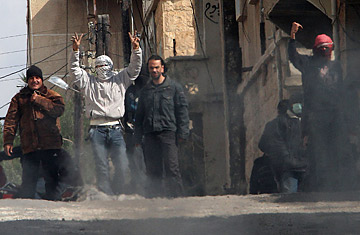
Antigovernment protesters on the streets of Dara'a, Syria
Change, or at least the promise of it, appears to have come to Syria. President Bashar Assad, who boasted just a few months ago that his authoritarian state was "immune" to the youth-led revolts of the Middle East, bent to the will of his people on Thursday, announcing moves to implement unprecedented reforms to his one-party Baathist state. Presidential aide Bouthaina Shaaban read out a list of decrees at a news conference in Damascus. Shaaban insisted that Assad, despite having ultimate control of the party and regime, did not order security forces to fire on protesters in the southern city of Dara'a, where at least 36 people were killed in less than a week.
The promises were dramatic. Assad has long ignored demands to lift the 48-year emergency law, but on Thursday Shaaban said the President would study scrapping it, as well as the Baathist monopoly on power, opening the possibility that the tightly controlled country might become a multiparty state. The President, Shaaban said, would also mull ways to raise living standards and loosen his grip on the media.
But will these promises be any different from the many Assad has made and failed to implement since he became President after the death of his father in 2000? Is it just a stalling tactic, a bid by a once unshakable regime to stave off what activists expect will be nationwide antigovernment demonstrations after Friday prayers on March 25? The President portrays himself as a reformist, pitted against his father's old guard, yet he rules with an iron fist.
That iron fist appeared to be at work even as Assad's promises were announced. More bloodshed was reported out of Dara'a, a city in southern Syria that has been the site of huge antigovernment protests since last weekend. According to human-rights activists, the city has been ringed by thousands of security forces who are intent to snuff out any further dissent. One prominent human-rights activist in Damascus, who requested anonymity for fear of reprisals, said the Syrian capital was also swarming with more than the usual number of security forces. They appeared to be concentrated around mosques.
Human-rights activists have supplied TIME with a list of at least 36 people they say have been killed in Dara'a since unrest exploded onto the streets last week. Tens of thousands of people took part in the funerals for several protesters in the city on Thursday, despite the threat of continuing regime violence. Amnesty International said in a press release that at least 93 people have been arrested this month across the country, but added that the real figure is "likely to be considerably higher."
